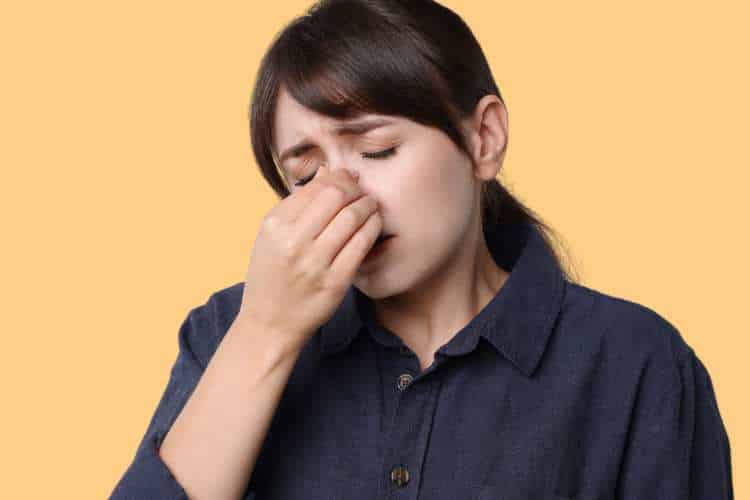Ayurvedic Treatment for Sinusitis in Coimbatore
Best Ayurvedic Treatment for Sinusitis in Coimbatore
Ayurvedic Treatment for Sinusitis at Avanika Ayurvedic primarily involves teekshna nasya (nasal instillation of potent medicated oils), dhoomapana (herbal smoking), thalam (application of herbal paste over the crown), swedana (herbal steaming), ghrutapana (consumption of medicated ghee), vamana (therapeutic emesis), kavala (oil pulling or gargling), and gandusha (retention of medicated oil or decoction in the mouth). At Avanika Ayurvedic Hospital, Ayurvedic treatment for sinusitis focuses on clearing blocked sinuses, balancing the doshas, and rejuvenating respiratory health.

Pure Herbal

Evidence Based

Guranteed Results
Book An Ayurvedic Treatment for Sinusitis in Coimbatore.
If you are looking for an Ayurvedic Treatment for Sinusitis in Coimbatre Book an appointment and get free consultation.
Aim of Our Ayurvedic Treatment for Sinusitis?
- To balance aggravated doshas (Kapha and Vata) through external and internal therapies
- To improve natural drainage of mucus from the sinuses and ease nasal congestion
- To restore the health of nasal passages using traditional treatments like nasya and swedana
- To reduce the recurrence of sinus infections by strengthening the immune system in immunocompromised
- To offer long term benefits by addressing root causes such as poor digestion, weak immunity, and doshic imbalance
Benefit of Avanika's Ayurvedic Treatment Package for Sinusitis
- Personalised Treatment Plan: A Treatment plan tailored to the individual constitution can enhance therapeutic outcomes
- Lifestyle and Dietary Guidelines: Supports long-term sinus health through diet, routine, and yoga
- Reduced Headache and Nasal blockage: herbal therapies help reduce the frequency of sinus headaches, sneezing, and nasal blockage
- Natural detoxification through Panchakarma: Removes accumulated doshas and toxins from the body
- Improved breathing and reduced congestion: Nasal therapies may help open up blocked passages
- Reduced reliance on painkillers: herbal therapies aim to provide relief without the use of synthetic medications

What is Sinusitis ?
Sinusitis is the inflammation of the paranasal sinuses—air-filled cavities around the nose and eyes.
When these sinuses become blocked due to infection, allergens, or structural issues, they trap mucus, leading to pressure, pain, and difficulty breathing.
It may be classified as acute (lasting less than 4 weeks), subacute (4-12 weeks), or chronic (lasting more than 12 weeks).
Chronic sinusitis may often go unnoticed and misdiagnosed, especially in individuals who confuse it with seasonal allergies or persistent colds.

What are the symptoms of Sinusitis?
- Heaviness or facial pressure and pain: Especially around the eyes, forehead, and cheeks
- Nasal discharge: Often yellow or green in colour which can be either watery or thick discharge.
- Persistent nasal blockage: Difficulty breathing through the nose
- Headache and heaviness: Dull or throbbing pain in the head moe in the morning
- Loss of taste or smell: Due to blocked nasal pathways
- Night-time coughing: Postnasal drip causing throat irritation
- Other ENT issues: Toothache, ear pain, or a feeling of fullness in the ears can also be experienced in some cases
- Bad breath (halitosis): Due to bacterial overgrowth in stagnant mucus
- Sore throat and hoarseness in the voice: Throat pain associated with itching in the throat
- Nasal bleeding: This can occur when the condition becomes severe
What are the causes of Sinusitis?
Several factors can trigger sinus inflammation, leading to sinusitis. Here are few:
- Environmental irritants: Exposure to pollutants like dust, smoke, mold, pollution, strong fumes and pet dander
- Infection: Common cold as a result of bacterial, viral, or fungal infections in the sinuses often trigger sinus inflammation
- Allergies: Allergens like pollen, dust mites, pet dander can trigger or exacerbate sinusitis
- Anatomical factors: Conditions like nasal polyps, a deviated septum, or a narrowed sinus opening can make you more prone to sinusitis
- Poor lifestyle habits: Irregular sleep, junk food, sedentary routine
- Seasonal Changes: Sudden weather changes, frequent air travel, or prolonged exposure to air-conditioned environments can worsen symptoms
Risk factors
Some individuals are more prone to developing sinusitis due to:
- Chronic respiratory infections
- Smoking or exposure to second-hand smoke
- Weak immune system
- Living in a highly polluted area
- Structural issues in the nasal cavity
- Recurrent allergies or asthma
- Frequent respiratory infections
- Allergic rhinitis or asthma
- Exposure to pollutants or cold environments
- Family history of sinus problems
- Occupational exposure to chemicals, paint fumes, or airborne irritants
- Lack of regular physical activity
- Poor stress management
Ayurvedic Perspective on Sinusitis
In Ayurveda, sinusitis is correlated with a condition called “Kaphaja Shirashoola” or “Peenasa. Or Dushta Pratishyaya” It arises due to an imbalance in Kapha and Vata doshas. Vata governs movement and is responsible for airflow and nervous system regulation, while Kapha governs structure and fluid balance, including mucus production. When Kapha becomes aggravated and accumulates in the sinuses, it leads to obstruction and inflammation.
This condition is exacerbated by factors such as:
- Excessive consumption of dairy, oily, and cold foods
- Sedentary lifestyle
- Overeating or irregular food habits
- Daytime sleep
- Exposure to cold, dusty, or damp environments
- Symptoms often worsen in Kapha-dominant times of the day, such as early morning or late evening.
- Mental stress and emotional imbalances like anxiety or worry are also believed to aggravate Vata dosha, worsening symptoms
- Ayurveda also considers seasonal influences such as spring (Kapha season) to be more conducive to sinus-related discomforts
Ayurvedic treatment for Sinusitis in Coimbatore
The primary goal of Ayurvedic treatment for sinusitis is to pacify the aggravated Kapha and Vata doshas, clear nasal passages, improve sinus drainage, and prevent recurrence. It aims to address the root cause—not just the symptoms—by detoxifying the system, enhancing immunity, and promoting long-term respiratory wellness.
External Therapies
- Nasya (Nasal Drops) and Dhoompana:
Medicated oils like Anu Taila or Shadbindu Taila are instilled into the nostrils to help clear nasal passages, reduce congestion, and lubricate the sinuses. Herbal fumigation (Dhoomapana) is a traditional technique in which medicated smoke is inhaled to clear nasal channels. - Neti (Nasal Irrigation):
Using a neti pot with a saline solution helps flush out mucus and allergens from the nasal passages, offering immediate relief. - Steam Inhalation (Swedana):
Herbal steam with essential oils like eucalyptus or mint helps liquefy mucus, reducing nasal blockage. - Ghrutapana (Internal Ghee Consumption):
Consuming medicated ghee helps pacify vata and lubricates the internal mucosal linings. - Vamana (Emesis):
A Panchakarma procedure that removes aggravated Kapha from the stomach and respiratory tract, offering relief in chronic sinusitis cases. - Tikshna Basti (Medicated Enema):
Used to balance vata and expel toxins from the colon, indirectly supporting sinus health. - Daha Karma, Raktamokshana (Bloodletting), Upanaha (Poultices), and Lepa (Topical Applications):
These therapies are suggested depending on individual assessment by an Ayurvedic physician. - Gandusha (Oil Pulling) and Kabala:
Oil swishing with sesame or coconut oil supports oral and sinus hygiene and reduces inflammation.
Ayurvedic Internal Medications
- Pathyakshadhtryadi Kashayam
- Dasamoolakadutrayam Kashayam
- Laxmivilasa rasam
- Sitopaladi churna
- Abhraka bhasma (Shataputi)
- Vyoshadi Vatakam
Lifestyle Recommendations for Sinusitis Patients
Ayurvedic treatment is incomplete without lifestyle changes and has laid strong emphasis on Dinacharya (daily routines) and Ritucharya (seasonal routines). Here are few lifestyle tips to manage and prevent sinusitis:
- Avoid exposure to cold winds and damp conditions
- Practice Pranayama (breathing exercises) to support lung and nasal function
- Use warm water for drinking and bathing
- Stay active with moderate physical exercise like yoga
- Avoid sleeping during the day, especially after meals
- Limit screen exposure and promote quality sleep
- Use Ayurvedic nasal drops like Anu Taila every morning to lubricate nasal linings
- Keep your surroundings dust-free by regularly cleaning and using air purifiers when needed
- Maintain regular bowel movements as constipation can aggravate Vata and indirectly impact sinus health
Diet During Ayurvedic Treatment for Sinusitis
Diet plays a crucial role in maintaining dosha balance. A Kapha-pacifying diet can be beneficial in managing sinusitis:
To Favour
- Include warm, cooked, and easily digestible foods
- Favour spices like ginger, black pepper, turmeric, cinnamon, and cumin
- Drink herbal teas like tulsi, ginger, or licorice root
- Incorporate bitter and astringent vegetables such as bitter gourd, methi, and drumstick
- Eat spicy foods as spicy foods are rich in compounds like capsaicin which may help thin mucus and ease inflammation
- Staying hydrated is key. Aim for 6-8 glasses of water per day to keep your nasal passages moist.
- Including hot soups, stews and broths are also great options.
- Limit dairy, wheat and sugar as it can increase mucus production
- Add ginger, garlic and turmeric
To Avoid
- Cold beverages, and refrigerated foods
- Sweets, fried food, and processed items
- Fatty foods like pizza, cheese, pasta etc
- Sugary foods and drinks can trigger sinus inflammation
- Milk and other dairy products
- Alcohol dehydrates the body, leading to thicker mucus and potentially exacerbating sinus symptoms.
- Foods with high histamines like tomatoes, cheese, and certain processed meats can worsen sinus symptoms.
- Identify foods that trigger your allergies, as they can worsen sinus symptoms.
- Some individuals may find that spicy foods, acidic foods, or even certain fruits like bananas can irritate the sinuses and worsen congestion.
- Gluten, soy, nuts and diary can cause nasal congestion in some individuals
How to Prevent Sinusitis in Natural Way?
Adopting healthy habits can significantly lower the risk of developing sinusitis. Here are few measures that one can adopt to prevent sinus headaches and inflammation:
- Maintain good hand hygiene to prevent infections
- Use a humidifier to prevent nasal dryness
- Stay hydrated by drinking warm fluids
- Avoid allergens and irritants
- Consult an Ayurvedic practitioner for seasonal detox (like Panchakarma)
- Perform regular nasal irrigation using a neti pot
- Avoid exposure to pollutants, smoke, and harsh chemicals
- Keep head and neck covered during cold weather to protect sinuses
- Develop a regular sleep schedule and reduce mental stress to support immunity
- Regular Abhyanga (oil massage) with warm oils can help balance Vata and support overall wellness
What are you waiting for...
Book an Appointment
Hours & Contact
28A Bharathi Park 7th Cross, Saibaba Colony, Coimbatore
641043
+9142229 69555
+9189039 69555
info@avanikaayurvedic.com
Open All Days 7:00 AM -7:00 PM
